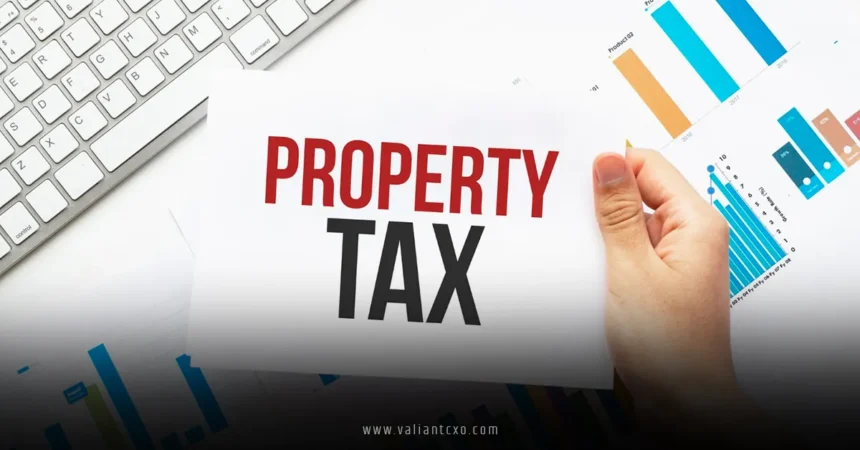Property tax is one of those inevitable parts of owning a home, land, or commercial building—like the air you breathe, it’s always there, quietly demanding your attention. Whether you’re a first-time homeowner or a seasoned real estate investor, understanding property tax can feel like navigating a maze. But don’t worry! This guide breaks it all down in a way that’s easy to grasp, packed with practical insights, and sprinkled with a conversational vibe to keep things lively. Let’s dive into the world of property tax and uncover what it means for you.
What Is Property Tax, Anyway?
So, what exactly is p-r-o-p-e-r-t-y t-a-x? At its core, it’s a tax levied by local governments on the value of real estate—think houses, condos, commercial buildings, or even vacant land. It’s like a membership fee for living in a community, funding essential services like schools, roads, fire departments, and public parks. The amount you pay depends on two main factors: the assessed value of your property and the local tax rate, often called the mill rate. Sounds simple, right? Well, hold on—there’s more to it than meets the eye.
Property tax varies widely depending on where you live. A cozy bungalow in a small town might have a much lower property tax bill than a sleek downtown condo, even if the properties are worth the same. Why? Because local governments set their own tax rates, and they’re influenced by everything from community needs to economic conditions. It’s like comparing apples to oranges—location is everything.
How Is Property Tax Calculated?
Let’s get into the nitty-gritty. Property tax is calculated using a straightforward formula: Assessed Property Value × Tax Rate = Property Tax Owed. But don’t let the simplicity fool you—this process has layers.
First, a local assessor determines your property’s value, usually based on its market value (what it could sell for) or a percentage of that value, depending on your state or county’s rules. This assessment might happen annually or every few years, and it considers factors like your property’s size, condition, location, and recent sales of similar properties. Think of it like a report card for your home’s worth.
Next, the local government applies a tax rate, often expressed as a percentage or in “mills” (one mill equals $1 per $1,000 of assessed value). For example, if your home is valued at $300,000 and the tax rate is 1.5%, your property tax bill would be $4,500 per year. But here’s the kicker: some areas offer exemptions or deductions, like for seniors or veterans, which can lower the final amount. Curious about your local rate? Check your county’s website—it’s usually public info.
Why Does Property Tax Matter to You?
You might be thinking, “Okay, I get what property tax is, but why should I care?” Great question! P-r-o-p-e-r-t-y t-a-x isn’t just a bill you grudgingly pay—it directly impacts your wallet, your community, and even your property’s value. Here’s why it’s worth paying attention to:
- It Funds Your Community: Property tax is the backbone of local services. Ever driven on a freshly paved road or sent your kids to a public school? Thank property tax for that. It’s like the glue holding your town together.
- It Affects Your Budget: For most homeowners, property tax is a significant expense, sometimes rivaling mortgage payments. Knowing how it works helps you plan better and avoid surprises.
- It Influences Property Values: High property tax rates can make a home less attractive to buyers, potentially lowering its resale value. Conversely, low taxes in a desirable area can make your property a hot commodity.
Understanding property tax empowers you to make smarter financial decisions, whether you’re buying a new home, budgeting for the year, or even challenging an unfair assessment (more on that later).
Who Pays Property Tax?
If you own any type of real estate—whether it’s a house, an apartment building, or a plot of land—you’re likely on the hook for property tax. Renters, you’re not entirely off the hook either. Landlords often pass on a portion of their property tax costs through higher rent, so you’re indirectly contributing. It’s like paying for someone else’s dinner when the bill gets split.
Even businesses and investors pay property tax on commercial properties, like office buildings or retail spaces. In some cases, vacant land is taxed too, though often at a lower rate. Bottom line? If you own property, property tax is part of the deal.
How Property Tax Varies Across the U.S.
Here’s where things get interesting: property tax isn’t a one-size-fits-all deal. Rates and rules vary wildly across states, counties, and even cities. For example, New Jersey often has some of the highest property tax rates in the country, with homeowners shelling out thousands annually, while states like Hawaii or Alabama keep things relatively low. It’s like comparing a gourmet meal to a fast-food burger—same concept, wildly different costs.
Why the variation? Local governments rely on property tax to fund their budgets, and their needs differ. A city with top-tier schools or shiny new infrastructure might have higher taxes than a rural area with fewer services. Plus, some states cap how much property tax can increase each year (hello, California’s Proposition 13), while others let it rise with market values. Want to know how your area stacks up? Check out resources like the Tax Foundation for state-by-state comparisons.
Factors That Influence Your Property Tax Bill
Your property tax bill isn’t just about your home’s value. Several factors can nudge it up or down:
- Location, Location, Location: Properties in high-demand areas, like urban centers or coastal towns, often face higher taxes due to pricier real estate and greater community needs.
- Home Improvements: Renovating your kitchen or adding a deck? That could increase your property’s assessed value, bumping up your property tax.
- Exemptions and Discounts: Many areas offer breaks for specific groups, like seniors, veterans, or low-income homeowners. Some even have homestead exemptions that cap taxes for primary residences.
- Local Budget Needs: If your town decides to build a new library or hire more firefighters, property tax rates might creep up to cover the costs.
It’s like a recipe—change one ingredient, and the whole dish tastes different. Staying informed about these factors can help you anticipate changes in your bill.
How to Manage and Pay Your Property Tax
Paying p-r-o-p-e-r-t-y t-a-x doesn’t have to be a headache. Most homeowners receive a bill once or twice a year, either directly from the local tax office or bundled into their mortgage payments through an escrow account. If you’re in the latter group, your lender collects a portion of your property tax each month and pays it on your behalf. Convenient, right?
But what if you’re paying directly? Here are some tips to make it painless:
- Set a Budget: Factor property tax into your monthly expenses to avoid a big hit when the bill arrives.
- Check for Discounts: Some areas offer early payment discounts or installment plans—check with your local tax office.
- Appeal if Necessary: Think your property’s assessed value is too high? You can often appeal it. Gather evidence, like recent sales of similar properties, and file a formal challenge with your assessor’s office. It’s like haggling at a flea market—persistence pays off.
Pro tip: Missing a payment can lead to penalties or even a lien on your property, so stay on top of deadlines. Websites like IRS.gov offer guidance on tax obligations, including property tax basics.
Common Myths About Property Tax
Let’s bust a few myths that might be floating around:
- Myth #1: Property Tax Only Applies to Homes: Nope! It covers all types of real estate, from commercial buildings to empty lots.
- Myth #2: Renters Don’t Pay Property Tax: As mentioned earlier, landlords often bake property tax into rent prices, so renters feel the pinch indirectly.
- Myth #3: Property Tax Is Fixed: Not true. Rates can change based on local budgets, and your bill can shift if your property’s value is reassessed.
Clearing up these misconceptions helps you approach property tax with confidence, like knowing the rules of a game before you play.
How to Save on Property Tax
Who doesn’t love saving money? Here are some practical ways to lower your property tax bill:
- Claim Exemptions: Check if you qualify for homestead exemptions, senior discounts, or veteran benefits. These can shave hundreds—or even thousands—off your bill.
- Challenge Your Assessment: If your property’s assessed value seems inflated, appeal it. You’ll need solid evidence, but it’s worth a shot.
- Stay Informed: Attend local government meetings to learn about proposed tax rate changes. Voicing your opinion can make a difference.
- Shop Around: If you’re buying a new property, compare property tax rates in different areas. A lower rate could save you big in the long run.
Think of it like hunting for a good deal on a car—do your homework, and you might drive away with savings.
Property Tax and Real Estate Investment
For investors, p-r-o-p-e-r-t-y t-a-x is a critical piece of the puzzle. High taxes can eat into your rental income or reduce your return on investment, while low taxes can make a property more profitable. When scouting investment properties, always factor in the property tax rate alongside other costs like maintenance and insurance. It’s like checking the weather before a road trip—you need to know what you’re driving into.
Also, keep an eye on tax incentives. Some areas offer property tax breaks to attract developers or revitalize neighborhoods. Websites like Zillow can provide insights into local tax rates and market trends to guide your decisions.
Conclusion: Take Control of Your Property Tax
P-r-o-p-e-r-t-y t-a-x might not be the most exciting topic, but it’s a crucial part of owning property. By understanding how it’s calculated, why it matters, and how to manage it, you can take control of your financial future. Whether you’re a homeowner, renter, or investor, staying informed about property tax empowers you to make smarter decisions, save money, and contribute to a thriving community. So, dig into your local tax rules, explore exemptions, and don’t be afraid to ask questions. Your wallet—and your peace of mind—will thank you.
FAQs About Property Tax
What happens if I don’t pay my property tax?
If you miss property tax payments, you could face penalties, interest, or even a tax lien on your property, which could lead to foreclosure in extreme cases. Always check with your local tax office for payment options.
Can I appeal my property tax assessment?
Yes! If you think your property’s assessed value is too high, you can file an appeal with your local assessor’s office. Provide evidence like recent comparable sales to support your case.
Are there ways to reduce my property tax bill?
Absolutely. Look into exemptions (like homestead or senior discounts), pay early for discounts, or appeal an overvalued assessment to lower your property tax.
Does property tax apply to rental properties?
Yes, landlords pay property tax on rental properties, and they often pass a portion of the cost to tenants through higher rent.
How often is property tax assessed?
It depends on your location. Some areas reassess property values annually, while others do it every few years. Check with your local tax office for specifics.
Click Here:valiantcxo.com


